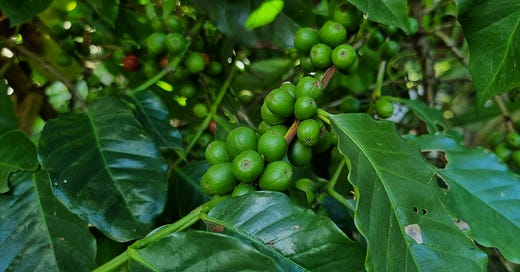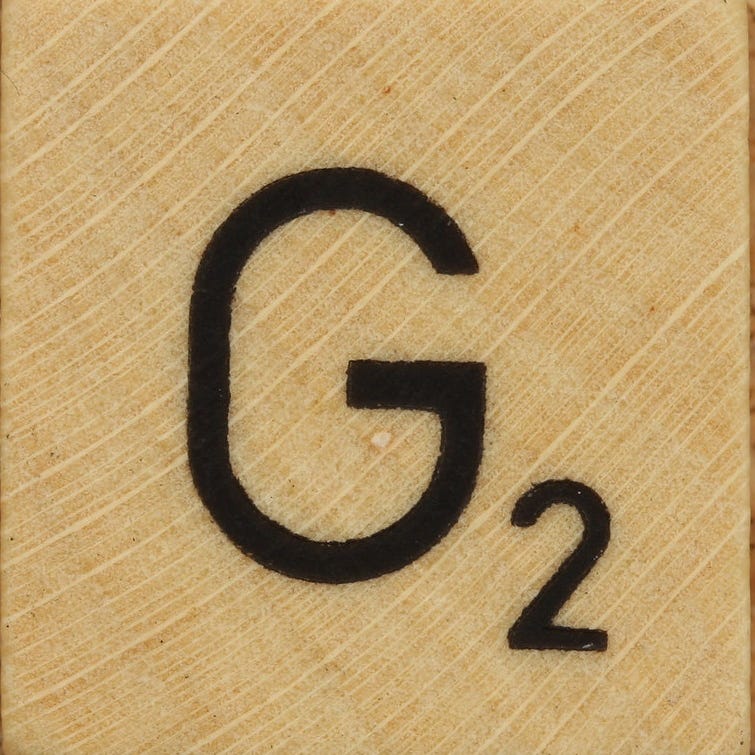Prompts for 11 April, 2025 from
Write about a new leader
sun-ripened ruins
“my story is over”
A character who is under arrest
7.
Pinta tried the door again. "Computer, open door," she tried. Instead of releasing the lock, however, the AI responded, "Manual mode activated. Key required. Code please."
Pinta leaned against the door, racking her brain for the code that would release the digital key. She was sure she knew it once. Her stitches itched, which didn't help her concentration. She checked on her father, who was soundly sleeping, his breathing regular. She would ask him when he woke up. In the meantime, she decided to do the homework so that her mother would not be suspicious that she wanted to know more about the fires that had destroyed so much and then buried by the AI.
Sighing, she opened the folder about coffee growing on Earth, back in the day when there was an Earth capable of sustaining life. She skimmed several articles about coffee plant nutrition requirements, growth cycles, and harvesting tips, but found them dull. Most of the information was the same as what she learned from her father in the greenhouse. Then she spied an editorial from an old newspaper about coffee revolutions in history. "This," she thought," is interesting." She read about the Ottoman Empire, where drinking coffee became a capital offense because the Sultans believed the people planned revolts in coffee shops. Hundreds of people were put under arrest, and even killed. Clergy of the 16th century Catholic church taught that coffee was satanic, until Pope Clement VIII decided it was delicious and blessed it, saying that if he could baptize it, he would. The most ironic story she found was of a Swedish death row inmate condemned to die by coffee, forcing him to drink three pots a day. The man outlived both the king and the doctor who was supposed to track his descent into hell for "science."
Coffee was the preferred drink during the Enlightenment, especially in France and the U.S. colonies, whose battles against the British began over tea imports. She followed the stories of falling coffee prices that led to revolution in Brazil in 1930 and took copious notes about poets, artists, and musicians who found coffeehouses to be places where their creative juices flowed. Even Beethoven, one of her father's favorite composers, wrote some of his music in a coffeehouse.
By the late 2100s, coffee farming waned. The changes in the climate meant that it became harder to grow. Other crops replaced it in all but a few select locations, and the prices skyrocketed until only the very wealthy could afford it. Farmers experimented with a corn-based brew that mimics coffee, but without the rich depth or the caffeine. It was during that time that Pinta's grandparents bought a tiny plot of land in the mountains of New Mexico to try and grow their own. They had been modestly successful until a wildfire roared through, leaving only sun-ripened ruins in its wake.
That was years before Pinta was born. Her father told her stories of his early childhood memories about the fire and how the loss of the farm led to his father's early death by stroke. "In those days," he told her,"people often passed from stress-related events like heart-attacks and strokes. It wasn't until the Congress installed a new leader, a scientist whose specialty was stress related blood disorders, that they discovered the trigger between events and poor health and developed ways to break the connection." Pinta wondered what might have happened to her father after this fire without those discoveries. She shuddered at the idea.
Pinta didn't like that her mother kept having her father sedated. It didn't make sense. He would be fine. He hadn't been badly burned and he was otherwise healthy. She scratched absently at her stitched forehead, thinking. Why did her mother lock the door? Why was her father sedated? Why were there so many fires and why did the computer deny them after the fact? Why couldn't Naimeh go back to work for weeks? Where was Naimeh anyway?
Pinta wasn't getting anywhere on her report, so she closed her computer and went to check on her father again. He was still, but his eyes were open and alert. She checked the camera and noted that it still faced the window, not into the room. She wondered why no one seemed to have noticed. Maybe her mother assumed that, since he was sedated, Father wouldn't go anywhere. Pinta sat at the chair by the bed.
"How are you feeling, Father?"
"A little groggy yet, but I will be fine. I feel stronger inside than I might look; I may be developing a tolerance for this sedating drug--but that's between you and me," he whispered. "I've been thinking, too. Remembering more about the fire and the days before."
Pinta leaned in. "Mother locked the door and locked me out of the computer except for what I needed for school. Is it about Arturo?"
Father nodded. "And a small group of people who want more power than our egalitarian ways allow. Sadly. Human nature is always the same."
"Can you tell me more? What can I do? Should I tell Mother?" At that, her father's eyes snapped with something between warning and alarm.
"Absolutely not. Not your mother, nor your sister--yet. We're in a chess match for our community, not checkers. I suspect someone assumes taking people out in a quest for power is merely a game of checkers. Jump over enough to clear the board, and you'll be crowned king. I think there are people who believe my story is over, but the truth will always come forward in the long term."
"Unless we kill the Bio the same way we killed Earth," muttered Pinta. Before her father could respond, the door unlocked, and Pinta's mother called out her name.
Resources:
https://freshcup.com/a-brief-history-of-coffee-in-revolution/






